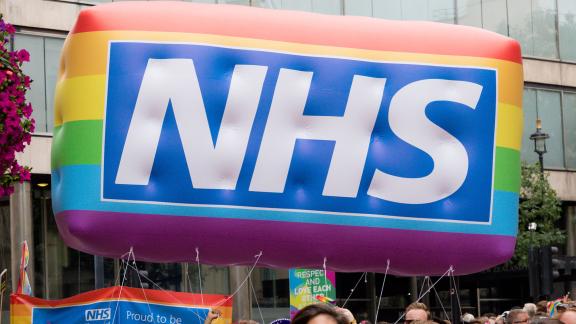Challenging the default
1 June 2020
Authors
-

Dr Michael Brady is a national advisor for LGBT health at NHS England and NHS Improvement.
LGBT history month and Pride season provide an opportunity for us to not only reflect on the past and recognise the progress that has been made towards LGBT equality, but it’s also a time to take stock and plan for the future.
Our society is one in which LGBT individuals still face stigma and discrimination. Homophobic and transphobic abuse and hate crimes are rising and both the mainstream media and social media are awash with transphobia. This lived experience impacts not only on the mental health and wellbeing of LGBT people, but also affects their health-seeking behaviour and their individual experiences at work.
The 2017 national LGBT survey with over 108,000 responses, described a situation where LGBT individuals face discrimination, felt their specific needs were not being met, had poorer experience and had major concerns about accessing healthcare that should be a right for all. We also see this reflected in NHS patient surveys and it is not just a problem for patients, it’s an issue we need to address for colleagues as well. The NHS staff survey demonstrates that lesbian, gay, bisexual and transgender staff fare worse than their heterosexual and cis-gendered colleagues in pretty much every measure, reporting higher rates of bullying, harassment and discrimination (from patients, colleagues and managers) and poorer health and wellbeing, satisfaction and career progression.
It can sometimes feel overwhelming when I think about what needs to be done to address all of this. We need to ensure the workplace is inclusive and a space where people can bring their whole selves to work – but what does that really mean and how do we achieve it? Whilst many of the solutions certainly sit within the institutions and organisations of the NHS, as individuals we share the responsibility and can all make simple changes to address the problems and create more inclusive workplaces that genuinely embrace those of us who are LGBT.
Visibility and language are important. We need to challenge the default heteronormative and cis-normative language (where we assume someone is heterosexual or that their gender identity matches their biological sex) in policies, on our websites and in information for both staff and patients. We must challenge homophobia, biphobia and transphobia wherever we see it and organisations need to be clear they have zero tolerance to this behaviour. I work in sexual health and HIV, which is about as ‘woke’ a speciality as you can get, and I’ve been fortunate to never feel discriminated against for my sexuality or ethnicity. It’s easy for me to talk about my husband with colleagues at work – but I know that not everyone is as fortunate. A truly inclusive workplace that respects all gender identities and sexualities has to be our goal.
There are already many examples of amazing work by LGBT staff networks across the country, which are doing much to promote inclusivity for both staff and patients, and I think these should be encouraged and supported by their organisations. An organisation that is genuinely inclusive and supportive of its LGBT staff is one that will be inclusive and supportive of its LGBT patients.Further information
Learn more about diversity in the NHS and LGBTQ+ equality in the workplace.
